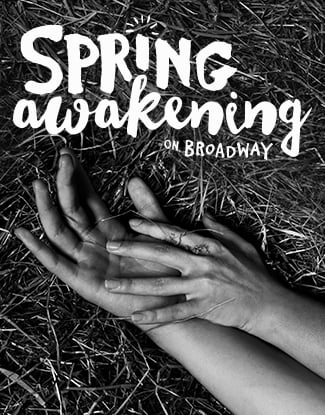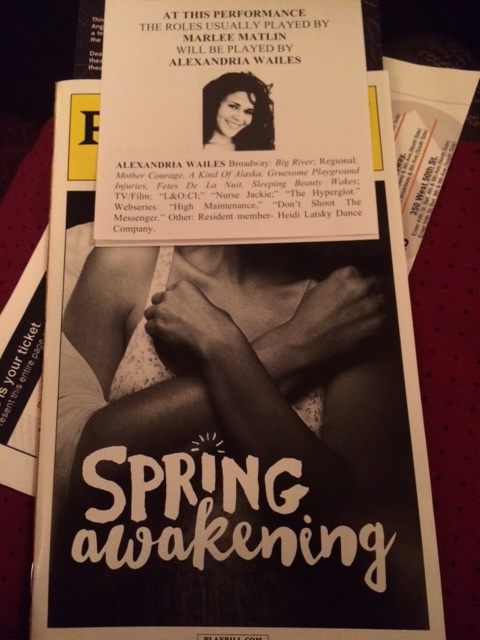Blog Archive
A Backstage Pass to Deaf West’s Production of Spring Awakening

A production of Spring Awakening which incorporates American Sign Language into the the performance is reaching all Broadway audiences .
I’m a huge fan of Broadway. Even before I started living in New York City, my favorite thing to do was going to see a Broadway show. I’ve been seeing a lot of plays coming back as revivals that I saw while I was in college. For some of those productions, I don’t feel that a revival is necessary. However, when I heard Spring Awakening was returning, I was thrilled. I have been hearing about this production since it started out in Los Angeles. This production is unique because the entire show is understandable to both hearing and Deaf members of the audience. I knew I had to see this revival when it came to Broadway not only because of the work that I do as the Education Associate for Access at the Tenement Museum but also because my colleague Alexandria Wailes is part of the production. Alexandria is our educator who is Deaf. About once every other month she leads a tour at the Tenement Museum in American Sign Language only. She was also involved with Deaf West’s production of Spring Awakening in Los Angeles and is involved with its current run on Broadway as an associate choreographer. Additionally, for a handful of performances Alexandria is going on as Marlee Matlin’s understudy. I went to see Alexandria and the rest cast of Spring Awakening last Tuesday and I couldn’t have had a better time.
The production seamlessly incorporates actors of all abilities while creating an extremely moving performance. There were lines and situations that I had heard in the original production that had not made an impact on me. For example, when Wendela, played by Sandra Mae Frank (who signs the part) and Katie Boeck (who speaks and sings it), performed the line: “It seems to me what serves each of us best is what serves all of us best,” I gasped and practically started to cry. That, to me, is the whole powerful and crucial message of the way this show is being done and it was always a part of the script. I was in awe.
Another exhilarating part of this experience for me was getting to see a colleague shine on a different kind of stage. Alexandria Wailes is a powerhouse when she leads tours at the Tenement Museum. Many visitors repeatedly come to the Museum to see her tell our stories. Her presence on stage was just as powerful and engaging. Earlier in the week I was able to chat with Alexandria about her involvement in this production:
Ellysheva Zeira: How did you first get involved with this production of Spring Awakening?
Alexandria Wailes: Michael Arden and I have been friends/colleagues since Deaf West’s BIG RIVER at Roundabout’s American Airlines theatre. We also did an LA production of PIPPIN. It was a given that we would always seek opportunities to work together again. When Spring Awakening came about, Michael asked me for my availability to be part of the workshop, as part of the creative team, two summers ago. I couldn’t due to commitments here in NY.
However, when the opportunity to do a production in the 99 seat venue at Inner City Arts arose, we worked out arrangements to fly me out and be involved for the last five weeks leading to opening.
They had already met and worked for about a month and half before my arrival.
The rest is history. In a nutshell, we went from a 99 seat venue in downtown LA to an upscale state of the art theatre in Beverly Hills to Broadway all within the span of a year. This is unheard of.
EZ: What has been your favorite part of the experience so far?
AW: My favorite part of this experience is tri-fold. The creative process itself leading up to opening, working with a cast with tremendous spirit of generosity, creativity, compassion and talent and being able to share this work in three different venues on two coasts!
EZ: What is it like for you to be on a Broadway stage?
AW: Being on Broadway is being home.

Tenement Education Alexandria Wailes's understudy sheet for one night's performance of Spring Awakening.
EZ: Do you find any similarities between giving a tour at the Tenement Museum and your role in Spring Awakening?
AW: The similarities between tour presenting and Broadway performances (or any other performance for that matter) is the live experience. There are always variables arising from night to night. Different audience energies, a microphone goes out, a guitar string breaks, etc. It is amazing how the company comes together to get through the shows. An ensemble in the best sense.
EZ: What kind of impact do you hope/think this show will have in the Broadway community? Do you think its impact will extend beyond Broadway?
AW: The show has already made a lot of noise and shook up people’s preconceived ideas about deafness, ASL, deaf culture and how theatre can be presented. There are talks of a nationwide/international tour. Even if we go to another country presenting this production in ASL, there will likely be supertitles with the language of that country affixed to the proscenium of the stage for audiences.
Spring Awakening is about self-discovery, awareness and the degrees of communications and how people desire to be understood- mentally, spiritually, emotionally and or physically. I believe that for this particular production, in the last two years, we upped that notion and raised the bar by thickening the ‘sauce’ with some relevant Deaf history content that underscores the entire experience of Spring Awakening.
Frank Wedekind penned this play in 1891. Steven Sater and Duncan Sheik created the musical version about ten years ago. We created ours in 2014. Some light background info on what was happening in the world when Wedekind penned this creates interesting connections (however I strongly doubt that he was responding to the following). The Second International Congress on Education of the Deaf (known as the Milan Conference) of 1880 changed lives of Deaf/ deaf people all over the world. Alexander Graham Bell had a part in this. It marked the start of the ‘Dark Ages’ for the Deaf community. The biggest change was the notion that all deaf people had to learn speech/lip-reading and not sign (in fact they were prohibited from signing) in order to be considered ‘equal’ to their hearing peers. Otherwise, one was deemed an oral failure and marginalized in life. This created segregation within the community between those who could not ‘speak’ clearly and those who could. We are slowly emerging out of that, but it is not without a constant fight.
EZ: That background becomes an essential part of the world of the play and I was amazed at how seamlessly that history fit into the narrative at hand. To me, it made the story that much more powerful and relevant. It was almost like he did write it with that history in mind!
Spring Awakening is playing at the Brooks Atkinson Theatre from now until January 24th and it will not be extended. Do not miss your chance to see this brilliant and inclusive show. Visit http://www.springawakeningthemusical.com/ for more details. You can also enter a lottery for $35 tickets which is drawn 90 minutes before show time in both English and ASL, with support from the place where I take ASL class, The Sign Language Center.
–Posted by, Ellysheva Zeira, Education Associate for Access
